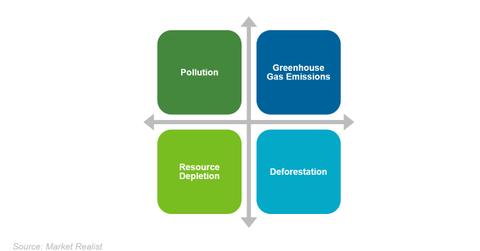Evaluating ESG for the Effects on Environmental Issues
Some issues considered under the environmental criterion when evaluating a company’s products and practices are pollution, carbon emissions, and resource depletion.
Nov. 1 2016, Published 2:43 p.m. ET

ESG criteria
In the previous article, we noted that socially responsible investing is done on the basis of environmental, social, and governance (or ESG) criteria. Analysts look at the operations of a company from these three perspectives to evaluate its standing among its peers.
Given their mandate, analysts use different strategies to invest in companies when making use of ESG criteria. It’s important to note that a given issue can’t strictly be classified as either environmental, social, or governance-related.
Environmental issues
Some issues considered under the environmental criterion when evaluating a company’s products and practices are:
- pollution
- carbon emissions
- greenhouse gas emissions
- resource depletion
- climate change
- hazardous waste disposal
- toxic chemical use
- deforestation
These and other environmental issues can be considered both as opportunities as well as threats. For instance, climate change can be a threat to a product a company is selling. If that product forms a large part of the company’s sales, then its profits will be hurt in the future if it doesn’t devise a strategy to deal with its product mix.
Meanwhile, if a company is in a niche segment of hazardous waste disposal, a rise in such waste—which we’re experiencing presently—would be a boon for such company and its valuation.
One example of the impact of an environmental issue on a company’s share price is the oil spill ExxonMobil was involved in in Alaska in 1989. A more recent example is the oil spill caused by BP (BP) in the Gulf of Mexico in 2010, which adversely impacted the company’s stock price.
Even more recent examples are the emissions scandals surrounding automakers Volkswagen (VLKAY) and Mitsubishi Motors. Things continue to worsen for VLKAY, and Mitsubishi has forced its president to step down.
The iShares MSCI ACWI Low Carbon Target ETF (CRBN), the Etho Climate Leadership US ETF (ETHO), and the SPDR S&P 500 Fossil Fuel Reserves Free ETF (SPYX) are among those ETFs specifically focused on the “E” aspect of ESG factors.
From environmental issues, let’s move on to social issues in the next article.
